Brendan I. Koerner's Blog, page 4
October 25, 2013
Of Cults and Cops in the Dominican Republic
 There’s no question that the Academy for Future Health seems like a rather nutty organization; if Google’s translation of its German-language philosophy is to be trusted, then the Academy apparently believes that the Vatican has ties to extraterrestrials, and that a bunch of elite financiers are hip to an approaching Doomsday. So when police in the Dominican Republic raided the group’s command in October 2012, killing a top-ranking member in the process, it was easy to buy into the government’s version of events: that the Academy was stockpiling weapons, possibly in order to carry out terrorist attacks intended to hasten some sort of Ragnarok. The cops had perhaps saved dozens, even hundreds of lives by heading off the threat posed by these bizarre Germans.
There’s no question that the Academy for Future Health seems like a rather nutty organization; if Google’s translation of its German-language philosophy is to be trusted, then the Academy apparently believes that the Vatican has ties to extraterrestrials, and that a bunch of elite financiers are hip to an approaching Doomsday. So when police in the Dominican Republic raided the group’s command in October 2012, killing a top-ranking member in the process, it was easy to buy into the government’s version of events: that the Academy was stockpiling weapons, possibly in order to carry out terrorist attacks intended to hasten some sort of Ragnarok. The cops had perhaps saved dozens, even hundreds of lives by heading off the threat posed by these bizarre Germans.
Yet that easy-to-understand narrative has disintegrated over the past year, starting with the release of surveillance video that contradicted police claims that they encountered substantial armed resistance during the raid. Then came the revelation that the cops had seized approximately $1.5 million in cash and goods while taking down the Academy, and that a large portion of that booty had disappeared from official custody.
Now three Academy members who were on trial for attempted murder and weapons possession have been acquitted of all charges by a Puerto Plata court.
It would not be surprising to learn that the Academy did, indeed, have an arsenal stashed in its compound, or that it was involved in activities more nefarious than simply fleecing gullible Germans. But the truth will be hard to come by now that the Dominican police have made such a hash of the investigation. The only real takeaway here is one that you already knew: in the absence of well-structured governmental oversight, there can be a very fine line between cops and criminals.
October 22, 2013
A Quick Fix
 Given the state’s reputation as a mecca for opioid absuers, you will probably not be surprised to learn that West Virginia leads the nation in drug-overdose deaths. Yet the problem evidently has less to do with the sheer number of narcotics consumed than with a dangerous (and nonsensical) quirk of law:
Given the state’s reputation as a mecca for opioid absuers, you will probably not be surprised to learn that West Virginia leads the nation in drug-overdose deaths. Yet the problem evidently has less to do with the sheer number of narcotics consumed than with a dangerous (and nonsensical) quirk of law:
The state doesn’t allow police and firefighters to administer naloxone, a drug that counters the effects of pain-pill overdoses and saves lives during emergencies.
This is a terrible policy, since cops are typically quicker to arrive on scene than paramedics. Time and again, the evidence has shown that equipping the police with naloxone can significantly reduce the mortality rate among opioid addicts—a fact that is leading an increasing number of cities to adopt the harm-reduction approach.
Just as importantly, West Virginia is the sole place in the country where physician assistants are not allowed to prescribe naloxone (see above). Since overdose victims are likely to encounter such employees at understaffed hospitals before they see actual doctors or nurses, this prohibition can only lead to more sorrow. All of which raises a baffler of a question: who, exactly, is preventing the law from being changed in West Virginia? Whose interest does this serve, financially or otherwise? My best guess is that state politicians are under the mistaken impression that their constituents want addicts to pay the ultimate price for their mistakes. They underestimate the compassion and the pragmatism of those whose votes they need.
October 16, 2013
A Farmer’s Nonchalance
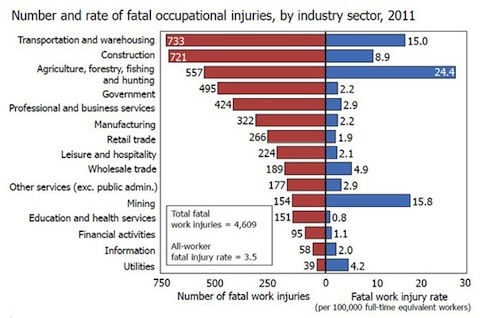 A quick Google News search for the term “farm accident” is all that’s required to grasp the perils of working the land. Despite copious safety advances since the early days of the mechanized thresher, agriculture remains a dangerous profession in large part because its essential tasks are often performed by individuals; if something goes amiss, help is often slow to arrive because the victim is trapped in a distant field.
A quick Google News search for the term “farm accident” is all that’s required to grasp the perils of working the land. Despite copious safety advances since the early days of the mechanized thresher, agriculture remains a dangerous profession in large part because its essential tasks are often performed by individuals; if something goes amiss, help is often slow to arrive because the victim is trapped in a distant field.
This is precisely the predicament in which Barry Lynch recently found himself. How he coped with the very real threat of slow death should be a lesson to us all:
Barry Lynch, 54, was preparing for a day’s work on an East Feluga cane farm on Tuesday morning when the drawbar of a crop sprayer collapsed on his leg, pinning him to the ground.
With no one in earshot and about nine tonnes of machinery collapsed on his leg, the veteran farmhand was able to remove his boot while deciding on his next move over a cigarette.
“I thought, ‘nobody’s going to miss me until maybe 7pm’, so I started digging,” Mr Lynch said.
Using a pocket knife that had belonged to his father, Mr Lynch dug through the rock-hard surface for the next six-and-a-half hours.
The next time you’re tempted to panic, think about Mr. Lynch enjoying a smoke with 19,842 pounds worth of machinery piled atop his leg.
October 9, 2013
A Family Affair
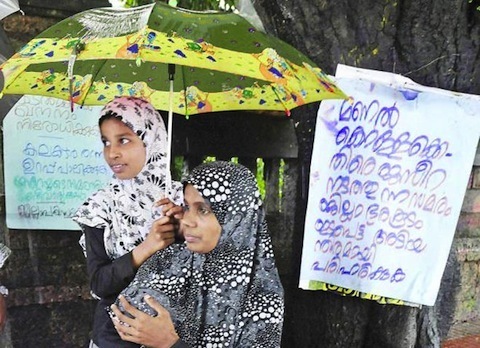 The exploits of the various Indian sand mafias has long been a topic of fascination ’round these parts. As the subcontinent’s construction boom has lead to an escalation in sand prices, miners have become eager to accumulate the granular material by any means necessary. In practice, that means excavating any strip of land they wish, and using a combination of bribery and violence to deal with those who might object.
The exploits of the various Indian sand mafias has long been a topic of fascination ’round these parts. As the subcontinent’s construction boom has lead to an escalation in sand prices, miners have become eager to accumulate the granular material by any means necessary. In practice, that means excavating any strip of land they wish, and using a combination of bribery and violence to deal with those who might object.
One women from Kerala, who goes by the sole name Jazeera, has recently become the public face of opposition to the mafias. She first spent over two months sitting in at the state’s capital, telling anyone who would listen that the illegal miners were destroying her private property. Now Jazeera has moved the show to Delhi, with her kids in tow:
On a bright blue tarpaulin spread out, the 31-year-old crusader is camping with her three children, the youngest Mohammad barely a year-and-a-half old, in this unfamiliar city…
An autorickshaw driver by profession, Ms. Jazeera is also fighting against a part of her own family. Her brother, she says, is part of the mafia that illegally dig sand, so the pressure to call off the protest has been immense even at home. “My husband, a madrasa teacher, supports me. He couldn’t come to Delhi, but my children are here,” she says.
Her daughters — 12-year-old Rizwana and 10-year-old Shifana — have been through the worst, but are not complaining.
They miss being at school, but would rather be with their mother. “Some students from Jawaharlal Nehru University have offered to teach them while we are here. I couldn’t have left them behind,” Ms. Jazeera says.
There is certainly an education to be had in all this, primarily about the interplay between politics and money. Here’s to hoping that Jazeera’s children veer more toward idealism rather than cynicism once the affair is settled.
October 8, 2013
The Circle of Life
 Fact-checking Tasmania’s claim to be the roadkill capital of the world is no easy feat, since few of its potential competitors (we’re looking at you, Madagascar) keep accurate statistics regarding flattened wildlife. One thing that is certain, however, is that the remote Australian state is a tireless innovator in the roadkill space, dedicating vast resources to mapping trouble spots and figuring out how best to care for victims. Not content to rest on their laurels, however, the Tasmanian authorities are now nudging the ball along even further, by advocating a plan to turn roadkill into compost:
Fact-checking Tasmania’s claim to be the roadkill capital of the world is no easy feat, since few of its potential competitors (we’re looking at you, Madagascar) keep accurate statistics regarding flattened wildlife. One thing that is certain, however, is that the remote Australian state is a tireless innovator in the roadkill space, dedicating vast resources to mapping trouble spots and figuring out how best to care for victims. Not content to rest on their laurels, however, the Tasmanian authorities are now nudging the ball along even further, by advocating a plan to turn roadkill into compost:
On farm, or just within gardens. I mean, look, people recycle sheep droppings. You regularly see people selling sheep poo on the side of the road. In our local area, those sort of things don’t last long. People are very quick to buy them. So I do think that there’s a market for recycled roadkill, potentially, in Tasmania.
But is this the most efficient use of roadkill? An argument could be made that the poor wallabies, possums, and bandicoots who meet their Maker on Tasmania’s roads might be more valuable as a direct source of calories for humans, rather than a nutrient for future vegetables. The trick, of course, would be to figure out a way to counteract an old taboo against eating meat that was once stuck to asphalt. An enterprising advertising firm should take up that grand challenge.
September 30, 2013
Hello Again
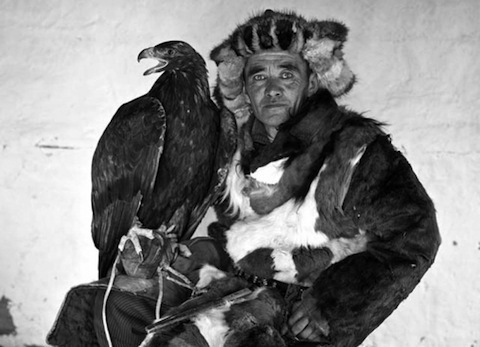 Contrary to what you may have concluded after several months of silence, I have not, in fact, abandoned this long-cherished experiment in storytelling. I had to shift Microkhan to the back burner during a long summer spent spreading the gospel of The Skies Belong to Us, an endeavor that took me to the far corners of this vast nation. And, to be frank, I had to breathe a bit after the book dropped—that project took a lot out of me, to the point that the healthiest move was to lay off the keyboard for a spell.
Contrary to what you may have concluded after several months of silence, I have not, in fact, abandoned this long-cherished experiment in storytelling. I had to shift Microkhan to the back burner during a long summer spent spreading the gospel of The Skies Belong to Us, an endeavor that took me to the far corners of this vast nation. And, to be frank, I had to breathe a bit after the book dropped—that project took a lot out of me, to the point that the healthiest move was to lay off the keyboard for a spell.
But I’m back now and eager to once again bring y’all the finest tales from the worlds of competitive falconry, Papua New Guinea, and the annals of smuggling. While I can’t promise that I’ll have the time to post daily, I do vow to be a much more diligent steward of this prime Internet property. Off to Kansas on a Wired assignment tomorrow, back back at you soon with something delectable. And by “you,” I mean the two or three people who have seen fit to keep Microkhan in their feeds—bless your hearts.
(Image via Palani Mohan’s project on Kazakh eagle hunters)
July 1, 2013
Reading is Not a Crime
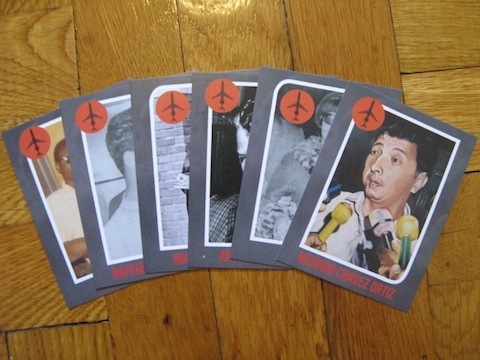 I have honestly been taken aback by the reluctance of many folks to read The Skies Belong to Us while traveling. Time and again, I’ve heard from people who refuse to bring the book on planes, for fear of freaking out their seatmates—or, more important, those meddlesome TSA screeners.
I have honestly been taken aback by the reluctance of many folks to read The Skies Belong to Us while traveling. Time and again, I’ve heard from people who refuse to bring the book on planes, for fear of freaking out their seatmates—or, more important, those meddlesome TSA screeners.
I’m sympathetic to these concerns, but also saddened by them. Simply reading a book of American history should never be an act that arouses suspicions. I would now like to stress that important point by offering y’all a delicious inducement to read The Skies as you transit from one city to the next.
To promote the book, the missus and I designed and printed 100 sets of skyjacker trading cards. There are now just 20 left, and I want to give these limited-edition gems away to brave souls who read The Skies while aloft—or, at the very least, in airports. How do you claim this scintillating prize? There are three easy ways:
1) Tweet a photo of yourself reading The Skies on an airplane or in an airport, along with either the hashtag #TheSkies or my handle (@brendankoerner). I will then reach out to get your mailing address.
2) Tag both yourself and me (+brendankoerner) in a Facebook photo of yourself reading the book on an airplane or in an airport.
3) Send me the relevant photo via email (brendan AT microkhan DOT com).
Yes, you can snap yourself reading the digital version. I’ll trust you to do the right thing and actually download the book, rather than just hold up a sample chapter for the camera. I believe in the innate goodness of our species.
June 18, 2013
The Skies
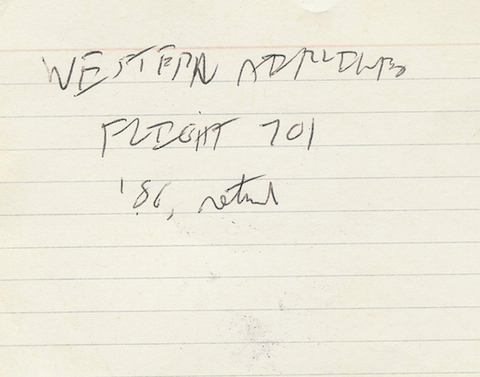 It’s a bit tough for me to believe that The Skies Belong to Us is finally out today. As dedicated followers of this project know, I’ve been working on the book for nearly four years, and there were many moments when its completion seemed an impossibility. The Grand Empress and the progeny can attest to all the dark moods I passed through while shaping the text—they’re saints for putting up with it all.
It’s a bit tough for me to believe that The Skies Belong to Us is finally out today. As dedicated followers of this project know, I’ve been working on the book for nearly four years, and there were many moments when its completion seemed an impossibility. The Grand Empress and the progeny can attest to all the dark moods I passed through while shaping the text—they’re saints for putting up with it all.
The notecard above was the seed of the The Skies—the first time I ever jotted down the idea. I pinned it to my corkboard in October 2009, as I do with many random story notions that pop into my skull. For reasons that will hopefully be clear if you check out the book, I just couldn’t let this tale go untold.
Please support the cause if you can. Microkhan is a lovely creative outlet, but it’s the books that should (theoretically) pay for the portable soccer nets that Microkhan Jr. so desperately craves.
June 16, 2013
Closer and Closer
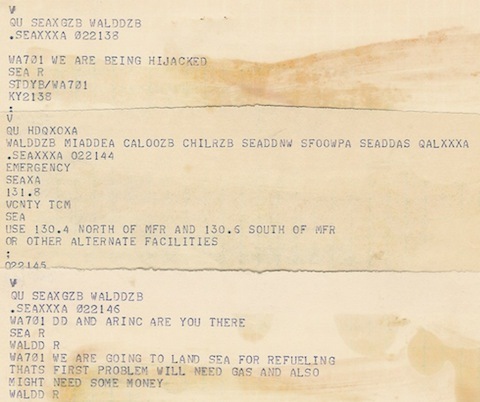 Less than 48 hours to go ’til The Skies Belong to Us officially drops, which is why I’m spending Father’s Day locked in the yurt, endeavoring to spread the good word. You can aid the cause by checking out this enthusiastic review from The New York Times, in which the book is described as “such pure pop storytelling that reading it is like hearing the best song of summer squirt out of the radio.”
Less than 48 hours to go ’til The Skies Belong to Us officially drops, which is why I’m spending Father’s Day locked in the yurt, endeavoring to spread the good word. You can aid the cause by checking out this enthusiastic review from The New York Times, in which the book is described as “such pure pop storytelling that reading it is like hearing the best song of summer squirt out of the radio.”
Sound like your kind of thing? Or simply appreciative of all the Papua New Guinea coverage I’ve brought you over the years? Please consider snagging a copy. I promise you won’t regret it.
June 10, 2013
The Final Countdown
Just eight days to go until The Skies Belong to Us goes live, a fact that explains my recent absence ’round this particular corner of the digital steppe. I’ll be popping up this week, though, to offer some Skies-related goodies, including a limited-edition set of skyjacker trading cards. In the meantime, check out the footage above from the 1961 hijacking of Continental Airlines Flight 54, a landmark episode that I also discuss in today’s Slate installment of “Skyjacker of the Day.” If anyone knows what became of Cody Bearden after his 21st birthday, please advise.




